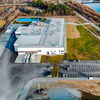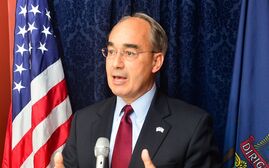Processing Your Payment
Please do not leave this page until complete. This can take a few moments.
- News
-
Editions
View Digital Editions
Biweekly Issues
- December 15, 2025
- December 1, 2025
- Nov. 17, 2025
- November 03, 2025
- October 20, 2025
- October 6, 2025
- + More
Special Editions
- Lists
- Viewpoints
-
Our Events
Event Info
Award Honorees
- Calendar
- Biz Marketplace
New law allows business development at Old Town airport
New federal legislation removes deed restrictions on land at the Old Town Airport, allowing it to be used for business development.
The bill, sponsored by U.S. Rep. Bruce Poliquin, R-Maine District 2, to help spur economic growth and job creation in Old Town, was signed into law by President Donald Trump.
According to a press release on Poliquin’s website, the new law revises an outdated law in Old Town by removing an obsolete deed restriction on a parcel of land next to the Old Town Airport. The law will allow the airport to move forward with the project of developing the land to attract new businesses and jobs to the area. Development of the law stems from work performed by Old Town officials, local business leaders, officials from the Old Town Municipal Airport and leadership in the House and Senate.
The town has invested more than $1 million in infrastructure improvements to help bring job creators to the site. Businesses have already expressed interest in the site.
But town officials discovered that antiquated restrictions prevented the site from being used for business development. The restrictions were rooted in the Bankhead Jones Farm Tenant Act, passed by Congress in 1937 and authorizing the federal government to acquire damaged lands for the purpose of rehabilitating the space for various programs, mostly related to farming. Some of the land purchased was in Old Town.
In the early 1980s, the Old Town land was sold to be used as part of the Old Town Airport with the stipulation that it only be used strictly for that purpose.
“Being able to have this land available at the airport for the city to sell is a huge economic boost,” Old Town Mayor David Mahan said in the release.
According to the Old Town Community and Economic Development website, the city has designed its new Airport Business Park with an environmentally friendly design, with investment of over $1.3 million in transportation, sewer, water, natural gas, electricity, telephone, and telecommunications fiber infrastructure. The park is viewed as presenting a unique opportunity for technology-based businesses and aviation-related businesses, especially those that develop from the unique niche created by the seaplane base on the Penobscot River.
For overall economic growth, the city has identified six targeted industry sectors that, through existing industry-academia collaborations spurred by the University of Maine, are expected to present the greatest opportunities for future growth: Forest bioproducts, advanced materials and composites, sensors and nanotechnologies, new media and IT, food sciences and human nutrition, and data centers and super-computing.
Mainebiz web partners
Related Content

The Giving Guide
The Giving Guide helps nonprofits have the opportunity to showcase and differentiate their organizations so that businesses better understand how they can contribute to a nonprofit’s mission and work.
Learn More
Work for ME
Work for ME is a workforce development tool to help Maine’s employers target Maine’s emerging workforce. Work for ME highlights each industry, its impact on Maine’s economy, the jobs available to entry-level workers, the training and education needed to get a career started.
Learn More
Groundbreaking Maine
Whether you’re a developer, financer, architect, or industry enthusiast, Groundbreaking Maine is crafted to be your go-to source for valuable insights in Maine’s real estate and construction community.
Learn more-
The Giving Guide
The Giving Guide helps nonprofits have the opportunity to showcase and differentiate their organizations so that businesses better understand how they can contribute to a nonprofit’s mission and work.
-
Work for ME
Work for ME is a workforce development tool to help Maine’s employers target Maine’s emerging workforce. Work for ME highlights each industry, its impact on Maine’s economy, the jobs available to entry-level workers, the training and education needed to get a career started.
-
Groundbreaking Maine
Whether you’re a developer, financer, architect, or industry enthusiast, Groundbreaking Maine is crafted to be your go-to source for valuable insights in Maine’s real estate and construction community.
ABOUT
NEW ENGLAND BUSINESS MEDIA SITES
No articles left
Get access now
In order to use this feature, we need some information from you. You can also login or register for a free account.
By clicking submit you are agreeing to our cookie usage and Privacy Policy
Already have an account? Login
Already have an account? Login
Want to create an account? Register
Get access now
In order to use this feature, we need some information from you. You can also login or register for a free account.
By clicking submit you are agreeing to our cookie usage and Privacy Policy
Already have an account? Login
Already have an account? Login
Want to create an account? Register











Comments